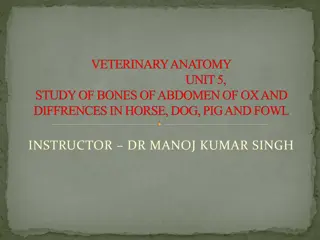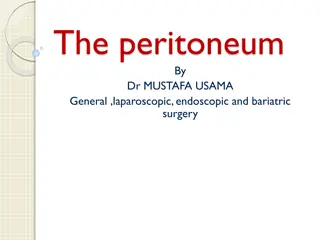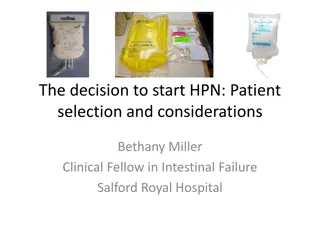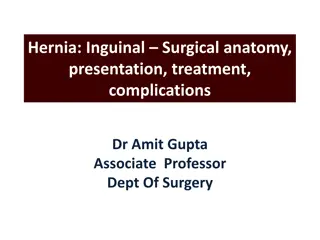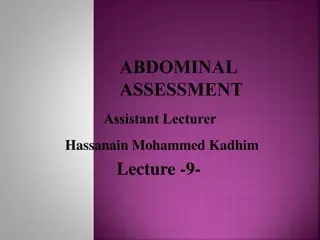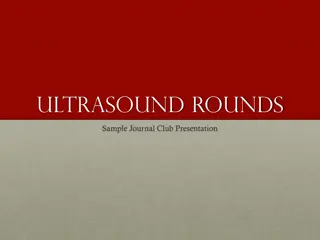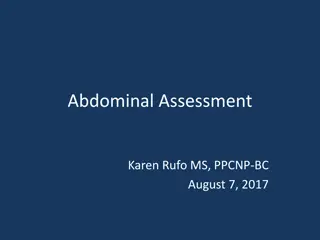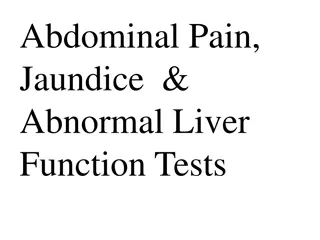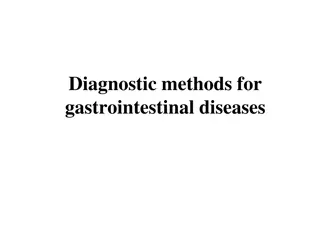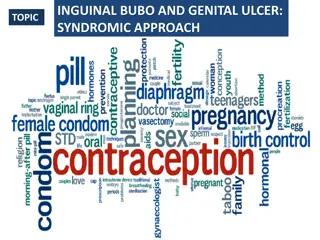Insect Abdominal Structures and Appendages: An Overview
The abdomen of insects plays crucial roles in respiration, reproduction, digestion, excretion, and metabolism. The number of abdominal segments varies across species, with reductions and modifications seen in different insect groups. From the propodeum to pregential and postgenital segments, each pa
1 views • 6 slides
Sheffield Early Help Assessment Form Update and Integration with Extended Support Plan
Sheffield has introduced an updated Early Help Assessment form to streamline the assessment process within the Early Help System. This new form combines the Early Help Assessment with the Extended Support Plan, aligning various assessment tools and referral forms into one comprehensive document. The
5 views • 22 slides
Enhancing Language Learning Through Peer Assessment
Explore the benefits of peer assessment as a valuable tool for language learning, comparing it with self-assessment. Discover the components and challenges of self-assessment, along with the potential of peer assessment to improve accuracy and promote self-regulation. Gain insights into what peer as
3 views • 29 slides
Comprehensive Approach to Pre/Post-Operative Emergency Management
The provided content covers a case of a patient post right hemicolectomy with abdominal pain. Initial assessment and management plan are discussed, emphasizing the importance of targeted post-operative assessment and recognizing serious post-operative pain causes. Other potential complications and e
2 views • 22 slides
abdominal Sarcoma treatment specialist in Pune
Dr Manoj Dongare provides the best treatment for abdominal sarcomas. He is the best abdominal Sarcoma treatment specialist in Pune
0 views • 1 slides
Overview of DSW End Point Assessment Team Leader Level 3
DSW End Point Assessment Team Leader Level 3 provides a clear understanding of the assessment process, ensuring individuals comprehend why and when it occurs, responsibilities involved, and how DSW supports them. It covers topics such as what End Point Assessment entails, assessment design and deliv
1 views • 18 slides
Case Review: Diagnostic Dilemma in Urology - Management Approach for a Patient with Abdominal Pain and Fever
A 58-year-old man with a history of diabetes and hypertension presents with fever and abdominal pain, raising multiple differential diagnoses including symptomatic AAA, pyelonephritis, acute appendicitis, complicated urolithiasis, or diabetic ketoacidosis. The case explores clinical manifestations,
1 views • 35 slides
Understanding Central Abdominal Pain and Masses in Clinical Practice
Abdominal pain evaluation involves considering various differential diagnoses such as appendicitis, small bowel obstruction, and mesenteric ischemia. By categorizing pain as visceral, parietal, referred, or radiating, healthcare providers can better understand the underlying pathology. The history o
0 views • 57 slides
Exploring Abdominal Health: Diagnostic Journey of a Complex Case
In this detailed case study, a 37-year-old woman presents with abdominal distension and pain, leading to a diagnosis of a mucinous cystadenoma. Through advanced imaging techniques and surgical exploration, the medical team navigates the complexities of her condition, highlighting the challenges and
0 views • 11 slides
Understanding Chronic Abdominal Pain in Children: Causes, Diagnosis, and Treatment
Chronic abdominal pain in children is a common issue, with underlying organic diseases being relatively uncommon. Factors such as stress, parental anxiety, and genetic predisposition can contribute to these symptoms. It is crucial to differentiate between functional and organic GI disorders through
1 views • 28 slides
Comparative Study of Abdominal Bones in Various Animals
Study of the abdominal bones in the ox highlights characteristics like elongated transverse and curved articular processes, whereas differences in horse bones include shorter bodies and varying curvature of transverse processes. Understanding these anatomical variances provides insights into the uni
0 views • 16 slides
Understanding the Peritoneum: Structure, Functions, and Inflammatory Responses
The peritoneum, a vital membrane in the body's abdominal cavity, consists of visceral and parietal components with distinct pain perceptions. It plays crucial roles in lubrication, fluid absorption, immune responses, and more. Peritoneal inflammatory exudate can result from various causes such as ba
0 views • 36 slides
Understanding Assessment in Medical Education
Exploring the concepts of assessment in medical education, including defining assessment, types of assessment, reliability, validity, and aligning assessment methods with intended learning outcomes. The importance of constructive alignment and the impact of assessment on learning outcomes are also d
1 views • 12 slides
Assessment Matters in Sociology: Enhancing Learning Through Evaluation
Explore the significance of assessment in sociology education, focusing on key questions to evaluate current assessment procedures, review individual course assessments, and develop strategies to enhance student learning outcomes. Delve into the centrality of assessment in the learning process, with
1 views • 15 slides
Insights into Managing Assessment in the Classroom by Assessment Research Group
Explore the importance of standards and assessment in education through the lens of the Assessment Research Group. Gain valuable perspectives on curriculum delivery, understanding the assessment system, learner assumptions, task parameters, and more. Discover how language, structure, and agency play
2 views • 25 slides
Understanding Proper Abdominal Incision Techniques in Surgery
Proper abdominal incision techniques are crucial in surgical procedures to ensure successful outcomes. Factors such as skin tension lines, anatomical structures, cosmetic considerations, and procedural access must be carefully considered when planning and executing incisions. The use of appropriate
0 views • 29 slides
Enhancing Understanding through Assessment in Educational Design Workshop
Learn and collaborate on assessment practices in education design at the "Understanding by Design Assessment Focus" workshop. The agenda includes sessions on summative and formative assessment, feedback, reporting, and more. Engage in activities like generating questions, finding destination partner
1 views • 76 slides
Institutional Assessment Planning Workshop Feedback and Insights
Feedback and insights from a recent institutional assessment planning workshop led by Dr. Mark Nicholas at FSU S. Warren Conference Center & Inn. Participants provided feedback on the usefulness of the content, presenter knowledge, ability to develop assessment plans, post-training assessment knowle
1 views • 9 slides
Understanding Abdominal Trauma: Epidemiology, Mechanism, Evaluation & Management
Abdominal trauma is a significant concern, notably in road traffic accidents. Blunt abdominal trauma (BAT) accounts for a majority of cases, with injuries commonly affecting the spleen and liver. Various mechanisms of injury and evaluation techniques, including examination signs and lab tests, aid i
0 views • 12 slides
Understanding Higher Education Assessment: The Complete Guide
Higher education assessment involves a systematic process of collecting, reviewing, and utilizing information to improve student learning and development. This guide covers the assessment cycle, learning outcomes, the mission behind assessment in higher education, what assessment is and is not, reas
1 views • 36 slides
Parenteral Nutrition in Intestinal Failure Related to Advanced Abdominal Cancer
Discussion on parenteral nutrition in patients with intestinal failure secondary to advanced abdominal cancer, including considerations for patient selection, Christie referral pathway, and practicalities of home parenteral nutrition. The background highlights the increasing commonality of home pare
0 views • 40 slides
Comprehensive Overview of Inguinal Hernia: Anatomy, Presentation, and Treatment
Inguinal hernia is characterized by an abnormal protrusion of viscus or a part of it through a weak point in the abdominal wall. It involves the anatomy of the inguinal region, including the superficial and deep inguinal rings, inguinal canal boundaries, and defense mechanisms. The anatomical classi
0 views • 37 slides
Understanding Gift Assessment Process at University of Washington
The Gift Assessment Process at University of Washington involves applying a 5% assessment to select current-use gifts over $1,000 and under $5 million. This assessment supports the university's advancement efforts and institutional priorities by transferring 5% of eligible contributions to the Provo
1 views • 5 slides
Comprehensive Guide to Abdominal Assessment for Healthcare Professionals
This lecture by Hassanain Mohammed Kadhim covers the essential techniques and subjective data needed for a thorough abdominal assessment. It includes objectives, equipment required, preparation steps, subjective data collection, inspection guidelines, abdominal landmarks, common causes of abdominal
0 views • 21 slides
Overview of Environmental Impact Assessment and Strategic Environmental Assessment Directives
Environmental Impact Assessment (EIA) and Strategic Environmental Assessment (SEA) play crucial roles in evaluating the impact of planned activities on the environment. This content delves into the concept, origins, development, and key elements of environmental assessment, discussing the legal fram
2 views • 35 slides
Understanding Chronic Functional Abdominal Pain: Clinical Diagnosis and Management
Chronic functional abdominal pain is characterized by persistent discomfort lasting over three months, with various underlying causes such as gastrointestinal disorders, genitourinary issues, and miscellaneous conditions. Diagnosis involves differential assessment and recognizing functional disorder
0 views • 26 slides
Institutional Assessment and Effectiveness Workshop Achievements at SUNY Oneonta
The Office of Institutional Assessment and Effectiveness at SUNY Oneonta has made significant progress in developing assessment protocols and processes, leading to a culture of assessment. This includes completing planning and assessment cycles, establishing objectives and procedures, and aligning u
1 views • 16 slides
Oregon Department of Education Assessment and Accountability Resources
Access important information on assessments, accountability, and reporting from the Oregon Department of Education. Find resources on updating assessment records, accessing student scores, and staying informed about assessment requirements for the 2023-24 academic year. Explore links for assessment
0 views • 55 slides
Oregon Department of Education - Assessment Resources and Updates
Explore the Assessment Record Updating Application (ARUA), Accountability Warehouse Extract (AWE), Secure Assessment Reports, and other important tools and information provided by the Oregon Department of Education for assessment data owners, analysts, and partners. Access links for assessment admin
0 views • 54 slides
Ultrasound Rounds: Clinical Case Study of 31-Year-Old Female with Abdominal Pain
31-year-old female presents to the emergency department with sudden onset severe abdominal pain localized to the RLQ. Her clinical history and examination findings are detailed, along with lab results showing positive beta-hCG. Ultrasound examination techniques including transabdominal and transvagi
0 views • 32 slides
Comprehensive Guide to Abdominal Assessment Methods
Learn the critical order of examination for abdominal assessment, including inspection, auscultation, percussion, and palpation. Understand how to assess skin characteristics, symmetry, abdominal muscles, bowel sounds, vascular sounds, organ size, and tenderness. Discover techniques to identify abno
0 views • 72 slides
Abdominal Wall Defects: Omphalocele and Gastroschisis Overview
Abdominal wall defects such as omphalocele and gastroschisis are congenital conditions where abdominal organs protrude through an unusual opening in the abdomen. These defects result from disruptions during embryonic development, leading to serious implications for affected individuals. Different ty
1 views • 42 slides
Comprehensive Radiological Imaging Review in Abdominal and Adrenal Pathologies
This extensive radiological imaging review covers a wide range of topics in abdominal and adrenal pathologies, discussing differential diagnoses, imaging modalities such as CT and USG, specific syndromes like prune belly syndrome, and conditions like retroperitoneal fibrosis. It delves into various
0 views • 39 slides
Abdominal Pain, Jaundice & Abnormal Liver Function Tests in an 8-Year-Old Boy
An 8-year-old boy presents with intermittent abdominal pain that occurs before breakfast and sometimes at school, relieved by activities. He also exhibits jaundice and abnormal liver function tests, indicating a potential underlying liver issue. Immediate medical evaluation is necessary to diagnose
0 views • 33 slides
Understanding Appendicitis: Causes, Symptoms, and Diagnosis
Appendicitis is a common cause of acute abdominal pain requiring surgical intervention. It predominantly affects individuals between 10 to 20 years, with abdominal pain being a key symptom. Diagnosis often involves imaging tests such as CT scans or ultrasound, along with physical examinations like R
0 views • 17 slides
Necrotizing Enterocolitis: Causes, Symptoms, Diagnosis, and Treatment
Necrotizing Enterocolitis (NEC) is a serious condition affecting mainly premature infants, with unknown exact causes but potential risk factors like impaired mucosal barrier and feeding issues. Clinical manifestations include feeding intolerance, abdominal distention, and blood in stools. Diagnosis
0 views • 23 slides
Diagnostic Methods for Gastrointestinal Diseases: A Comprehensive Overview
Explore various diagnostic methods for gastrointestinal diseases, including laboratory investigations, abdominal ultrasound features, and radiology techniques. Learn about the significance of different tests such as ESR, blood count, liver tests, and abdominal ultrasound in diagnosing conditions aff
0 views • 40 slides
Inguinal Bubo and Genital Ulcer: Syndromic Approach by Dr. Rohit Kumar Singh
This informative content discusses the syndromic approach to managing inguinal bubo, genital ulcers, urethral discharge, scrotal swelling, vaginal discharge, lower abdominal pain, and neonatal conjunctivitis. It includes recommended treatment regimens for lower abdominal pain and emphasizes the impo
0 views • 140 slides
Understanding Irritable Bowel Syndrome and Its Pathophysiology
Irritable bowel syndrome (IBS) is a common gastrointestinal disorder characterized by chronic abdominal pain and altered bowel habits. Despite the absence of organic causes, patients experience symptoms such as abdominal distention, bloating, and visceral hypersensitivity. The pathophysiology of IBS
0 views • 19 slides
Radiology of the abdomen
Abdominal radiology plays a crucial role in diagnosis using modalities such as X-ray, fluoroscopy, ultrasound, CT scan, and MRI. This technology helps assess conditions like bowel obstructions, calcifications, and more. Interpreting the gas patterns, diameters, and signs seen in abdominal imaging is
0 views • 47 slides




